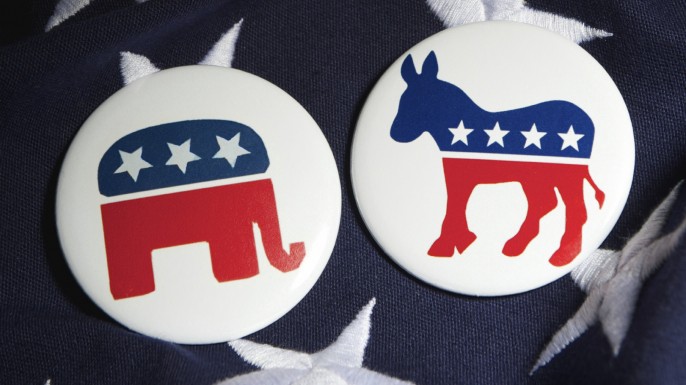How to manage stressful political conversations with friends and family
For the most part, we grow up being told not to discuss politics or religion in public settings. Most of what we heard about it was from our parents at the dinner table; and how they “didn’t get it” in regards to entertainment, the current administration, and really anything else that was “cool”. We might be able to talk about these subjects with ease with people that agree with us, but not a lot of us had adequate preparation to have these discussions with the friends, family, or significant others that hold differing opinions.
It’s the holidays, which for most means a hearty amount of family gatherings. I am going to go out on a limb and say that my thanksgiving wasn’t the only one full of cringe-worthy moments. Touchy stories, unsettled feelings, and everyone’s favorite topic: politics, can pollute your family time, and spout a dark cloud over everyone’s day. With the most recent election polarizing many individuals, it’s important that it doesn’t polarize your family and friends. For everyone’s benefit, here are some tips on how to passively deal with the elephant in the room.
Don’t take it personally
It’s much easier said than done; but when somebody disagrees with your ideology, understand they are not disagreeing with you as a person, just the belief you have. If they insult your beliefs, they are not calling you fat. When emotions get heated, we all can get defensive. If you separate the issue at hand, from the person holding a belief; you can still love the person, while disagreeing with their standpoint, regardless how egregious it may seem.
The Baby Boomers and Gen. X have witnessed more changes and transitions in society than any other generation before. Many have adapted quickly to understand, respect, and share in this “new world”, but let’s not forget those that can get left behind by globalization. Parts of the world don’t seem to adapt at the same rate as the coasts of the United States, but they’re still there, and their beliefs and opinions are still valid. So don’t be offended when someone holds a different belief than you. Instead, take pride in our diversity and embrace them as a person.

People either hold a political belief out of fear, or out of passion. Believe it or not, most people hold political standpoints based in fear, rather than passion. Believing out of fear can vary from a fear of Muslims, a fear of higher taxes, a fear of bans on guns, or a fear of discriminatory laws. What that actually means is a fear of terrorism, fear of being unable to pay your bills, fear of total government control, or a fear of nationwide hatred. We all can understand fear, but we don’t all agree on the solutions to those fears. While believing out of passion is much more powerful than believing out of fear, it is usually the starter of most arguments. If you’re passionate for your political beliefs, then the proper setting is a place where it actually makes a difference, NOT around the Thanksgiving table, or at the holiday office party. When you understand most people hold beliefs out of fear, you can build a bridge by recognizing you both share the same fear, but just believe in different solutions.
Standing up for what you believe vs. offending others’ beliefs
Something is said you strongly disagree with. “Do I say something?” you ask yourself. Your heart is racing, mind scrambling, when you realize: it’s just a cultural difference. When you are born in a different country, decade, or religion than another person; you will tend to have different standpoints on key issues. The only way out of this one: recognize your cultural differences.
You don’t get to pick the culture you are born into, and there is nothing wrong with embracing your cultural background. Culture is a beautiful thing! What about your beliefs? Think of your parents, and your grandparents. Do your beliefs align with what was always told to you by them? It is not a bad thing if they do, but ask yourself if your beliefs would be the same if you were born into a different family, or even a different country. Unrealistic hypothetical scenario, I know, but I want you to see perspective on something: the influence your cultural background has on the person you are. Respect their culture, and expect the same in return.
Communicate
“Communication leads to a community, that is, to understanding, intimacy and mutual valuing.” — Rollo May
I believe most problems in the world could and would be solved if people communicated properly (and stopped being so dang self centered). Neither of those things will ever happen, but communication is something that can be used to defuse any tense political conversation in your household.
1. Listen
The biggest problem when we listen is that we often listen to respond, instead of listening to understand. When we listen to respond, we are thinking of ways to refute what is being said. When we listen to understand, we are thinking of why they hold that belief. Listen to their words, and seek to understand why they believe what they believe.
2. Validate
We often surround ourselves with like-minded individuals that share our beliefs and interests. People just want acceptance, validation, and affirmation. We just want to feel like we aren’t completely bonkers!
If you accept who they are as a person, your relationship with that person is now priority over the political squabble. If you validate aspects of truth behind their standpoint, they will become less defensive towards you. If you affirm them, they will feel uplifted by the encounter, rather that drained from the dispute.
3. State why you believe what you believe
While they recover from the shock of you listening and validating them, you now have the opportunity to share your point(s) of view. Here’s where most people make a mistake: they share what they believe, rather than why they believe what they believe. When you boil it down, and simplify your standpoint to the big “why”, you never know what will be gathered and understood by the other party.
Agree to disagree
At the end of the day, put things into perspective. It’s okay to have differing opinions, nor will it do harm to just avoid the squabbles overall. But let’s face it, they will come up; because we’re Americans and for some reason we love politics and drama. When they do come up: don’t take it personally, understand the cultural differences, and communicate your way through the holiday politics. Happy holidays!
Originally published at medium.com


